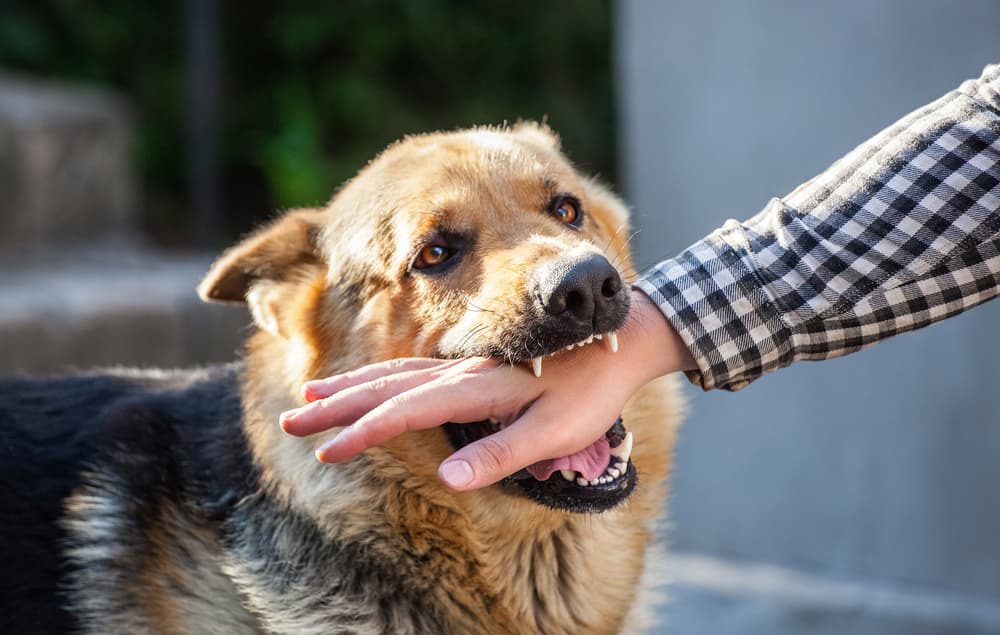When a dog attack occurs, it’s not just about the physical harm inflicted. It’s also about the emotional trauma, the medical bills, and the disruption it brings to your life. As a result, how much you can sue for a dog attack will depend on many factors.
Your best chance of obtaining maximum compensation is to hire a skilled dog bite attorney as soon as possible.
Legal Issues Resulting From Dog Attack Lawsuits

Nearly five million people in the U.S. suffer a dog bite each year, with about one million of them requiring medical help.
Beyond the severe, immediate pain and suffering, legal implications come into play.
In the eyes of the law, dog owners have a responsibility to ensure that their pets don’t harm others. This responsibility means taking necessary precautions to prevent attacks, such as proper training, leash laws adherence, and containment measures.
When a dog owner fails to uphold this duty, and their dog injures someone, you may hold them liable for the damages.
Negligence and Strict Liability
In dog attack lawsuits, the legal basis of a case often revolves around two primary theories: negligence and strict liability. These legal concepts determine the dog owner’s responsibility and the potential compensation you can receive.
Negligence is a standard legal theory used in dog attack cases. It asserts that the dog owner failed to exercise reasonable care in preventing their dog from causing harm to others.
This can include:
- Failing to leash or restrain the dog properly.
- Ignoring warning signs of aggression.
- Allowing the dog to roam freely in public areas.
To establish negligence, you must demonstrate that the dog owner breached their duty of care, directly resulting in the attack and your injuries.
Strict liability, on the other hand, imposes liability on the dog owner regardless of fault or negligence. Under strict liability laws, courts hold dog owners responsible for the actions of their pets, regardless of whether they were aware of any aggressive tendencies.
This means that even if the dog had never shown signs of aggression, the owner may still be liable for damages caused by a sudden attack. Strict liability laws vary by state, but they generally prioritize protecting victims of dog attacks by holding owners accountable for their pet’s actions.
Proving Fault
Proving the dog owner’s knowledge or fault in the attack is crucial in negligence and strict liability cases. You must provide evidence demonstrating that the owner knew or should have known about the dog’s aggressive tendencies or had failed to take reasonable precautions to prevent an attack.
This evidence may include witness testimonies, prior incidents involving the dog, or the owner’s history of negligence in controlling the animal.
Hiring a dog bite lawyer is your best chance of obtaining compensation for your injuries, medical expenses, emotional distress, and other damages incurred as a result of the attack.
With the help of a dog bite attorney who understands these legal theories and the importance of proving fault, you can effectively get through the process and pursue justice.
Factors Affecting Compensation
Several factors affect the compensation you may be entitled to receive when determining how much you can sue for in a dog attack case. Here are just a few.
How Badly You’re Hurt
One of the primary factors is the severity of the injuries sustained during the attack. More severe injuries, such as deep lacerations, fractures, or permanent disfigurement, often result in higher compensation amounts due to the increased pain and suffering endured.
Your Medical Bills
Medical expenses incurred due to the injuries also play a significant role in determining compensation.
These expenses include:

- Immediate medical costs
- Emergency room visits
- Surgeries
- Medication
- Ongoing treatment
- Rehabilitation
- Therapy expenses
The more extensive and long-lasting the medical treatment required, the higher the compensation you may be entitled to cover these expenses.
Lost Income
In addition to medical expenses, your lawyer will consider the impact of the dog attack on your ability to work and earn income when pursuing compensation.
If the injuries sustained in the attack prevent you from working temporarily or permanently, you may recover compensation for lost income or diminished earning capacity. It includes not only current lost income but also future income that you would have earned if not for the attack.
Emotional Impacts
Emotional distress and psychological impact resulting from the dog attack are also factors affecting compensation. The trauma of being attacked by a dog can lead to mental health issues that may require therapy or counseling.
The court may award compensation to cover the cost of mental health treatment and to compensate for emotional suffering.
Determining Your Damages
When determining how much you can sue for a dog attack, the damages you can sue for fall into two main categories: economic and non-economic. The extent of these damages will determine the overall compensation you may receive.
Economic Damages
Economic damages are tangible losses a dog bite attorney can easily quantify in monetary terms. These losses include medical bills and treatment costs incurred due to the dog attack.
From initial emergency room visits to ongoing rehabilitation and therapy expenses, all medical expenses directly related to treating your injuries are considered economic damages. Again, the more severe your injuries, the higher your medical bills, resulting in increased compensation to cover these costs.
Your economic damages also include the lost income and diminished earning capacity mentioned earlier.
Courts also consider property damage expenses caused by the dog attack economic damages. This includes damage to personal belongings such as torn clothing, destroyed property, or damage to other items in the vicinity of the attack.
While property damage may seem minor compared to physical injuries, it can contribute to your overall compensation.
Non-Economic Damages
In contrast, non-economic damages refer to intangible losses that cannot be easily quantified in monetary terms. These more subjective damages often include the pain and suffering you endured due to the dog attack. They encompass the physical pain, emotional distress, and trauma you experienced during and after the attack.
Compensation for pain and suffering addresses the non-financial impact of the injuries on your quality of life.
The emotional distress and trauma resulting from the dog attack mentioned above are also non-economic damages. This trauma includes anxiety, depression, post-traumatic stress disorder (PTSD), and other mental health issues that may arise because of the attack.
You may recover money to cover the cost of therapy or counseling needed to address these emotional consequences.
Loss of enjoyment of life is another non-economic damage the court may consider in dog attack cases. This refers to the loss of ability to participate in activities and hobbies you enjoyed before the attack due to physical or emotional limitations caused by the injuries.
While more challenging to quantify, compensation for loss of enjoyment of life aims to address the overall impact of the dog attack on your well-being and quality of life.
By considering both economic and non-economic damages, you can better understand the full extent of the harm caused by the dog attack and seek fair compensation to cover your losses.
The Legal Process for Pursuing Compensation

The legal process can be complex and daunting when pursuing compensation for a dog attack. However, understanding the steps involved can help you navigate the process more effectively and increase your chances of obtaining fair compensation for your injuries and damages.
These steps include:
Hiring a Dog Bite Lawyer to Investigate
The first step in pursuing compensation for a dog attack is hiring a lawyer so they can gather evidence and documentation to support your claim.
This evidence may include:
- Medical records detailing your injuries and treatment.
- Witness statements.
- Photographs of your injuries and the scene of the attack.
- Other relevant documentation, such as police reports or veterinary records.
Notifying the Dog Owner
Once your attorney collects the evidence, they’ll notify the dog owner and their insurance company of your intention to file a claim. They’ll send a formal demand letter outlining the details of the attack, the injuries you sustained, and the compensation you seek.
In many cases, the dog owner’s homeowner’s insurance policy will cover damages resulting from a dog attack, so you need a lawyer to notify their insurance company.
Insurance Company Negotiations
Your dog bite lawyer will then negotiate with the owner’s insurer to settle without going to court. Settlements involve back-and-forth discussions with the insurance company to agree on the compensation you will receive.
While settling out of court can result in a faster resolution than going to trial, it may not always result in the full compensation you deserve.
Going to Trial if Necessary
If negotiations fail to produce a satisfactory settlement, your lawyer will pursue litigation by filing a lawsuit against the dog owner.
A lawsuit typically involves submitting a complaint to the appropriate court and participating in the trial process, which may include pre-trial motions, discovery, and a trial before a judge or jury.
Throughout the legal process, your dog bite attorney will guide you, advocate on your behalf, and protect your rights. They’ll help you increase your chances of obtaining fair compensation for your injuries and damages.
By understanding the legal process for pursuing compensation for a dog attack and enlisting an experienced attorney’s help, you can confidently face the legal system and seek the compensation you deserve.
Limitations and Challenges in Dog Attack Lawsuits
When considering filing a lawsuit for a dog attack, you must be aware of the limitations and challenges you may encounter throughout the legal process. A lawyer who understands these factors can help you overcome potential obstacles and make informed decisions about your case.
The Statute of Limitations
One significant limitation to remember is the statute of limitations for filing claims related to dog attacks. Statutes of limitations vary by state and dictate the timeframe within which you must file your lawsuit after the incident occurs.
If you fail to file within the specified timeframe, you may lose the right to seek compensation. Therefore, you need a lawyer who understands your state’s statute of limitations and who will take timely action to protect your rights.
Limited Evidence
Another challenge you may face in dog attack lawsuits is the difficulty in proving the owner’s knowledge or fault, particularly in cases involving limited evidence or conflicting testimony.
You need a lawyer to establish that the dog owner knew or should have known about their dog’s aggressive tendencies, especially absent any prior incidents or witnesses to the attack. This can complicate the legal process and potentially affect the outcome of your case.
Insurance Limitations
Insurance coverage limitations and exclusions can also present challenges in dog attack lawsuits. While many homeowners’ insurance policies provide coverage for dog-related injuries, limitations or exclusions may affect the amount of compensation available to you.
For example, policies may exclude certain breeds of dogs from coverage or limit the compensation available.
A skilled dog bite attorney will know the terms of the insurance coverage and any potential limitations when assessing your options for pursuing compensation.
A skilled attorney can overcome the limitations and challenges in dog attack lawsuits through careful consideration and strategic planning.
A dog bite lawyer with an understanding of personal injury law can help you overcome these obstacles effectively. They can provide valuable guidance, advocacy, and representation to help you pursue fair compensation for your injuries and damages resulting from the dog attack.
Contact a Dog Bite Attorney Immediately
Even though the answer to how much you can sue for a dog attack might seem vague right now, a personal injury attorney can tell you once they get your case’s facts. Once that happens, they’ll do all they can to help you get every dollar you deserve.
We proudly serve Hillsborough County, Pinellas County, Pasco County, Polk County, and its surrounding areas in Florida:
Apex Law Firm - Tampa Office
412 E Madison St Suite 1206, Tampa, FL 33602
(813) 444-5212


